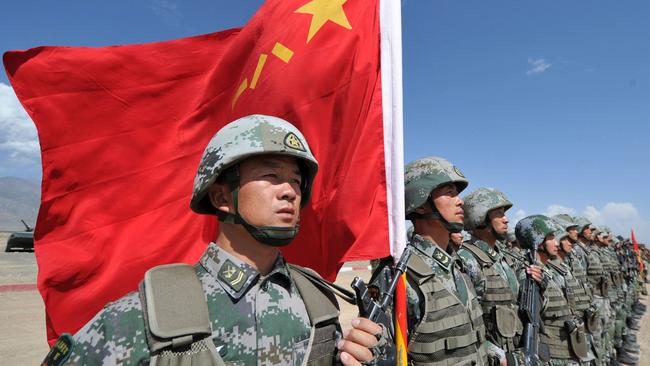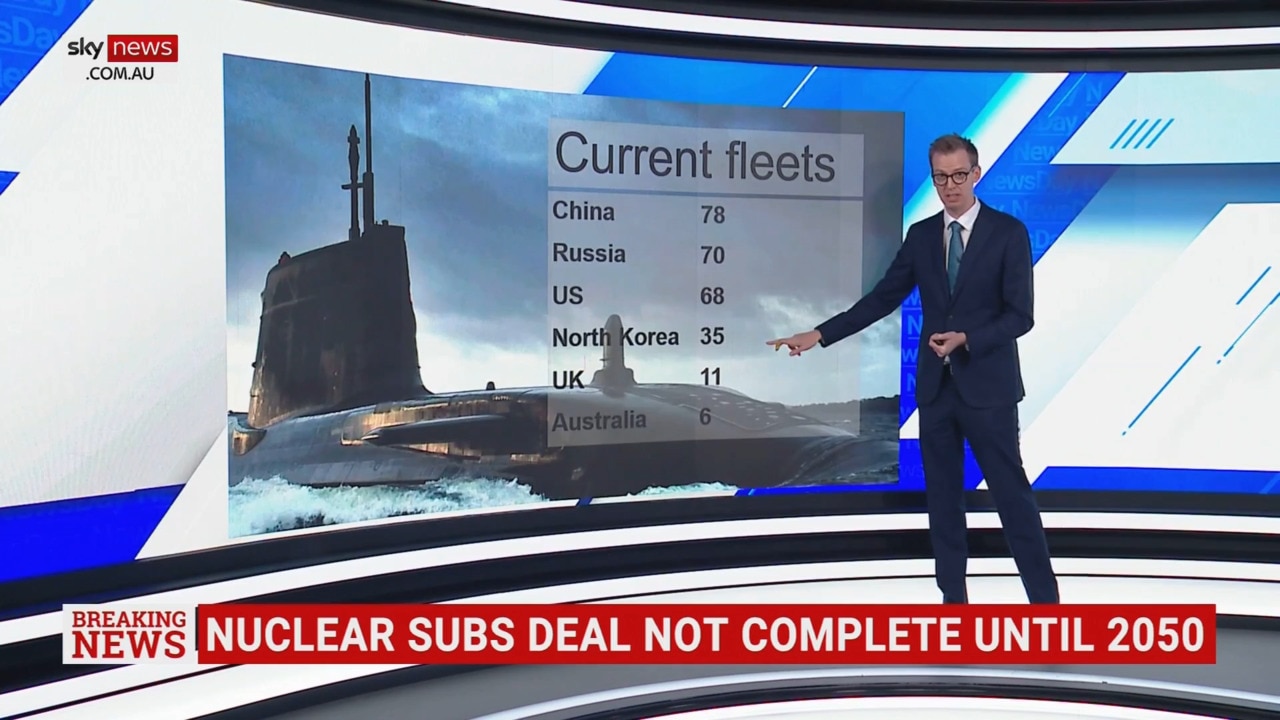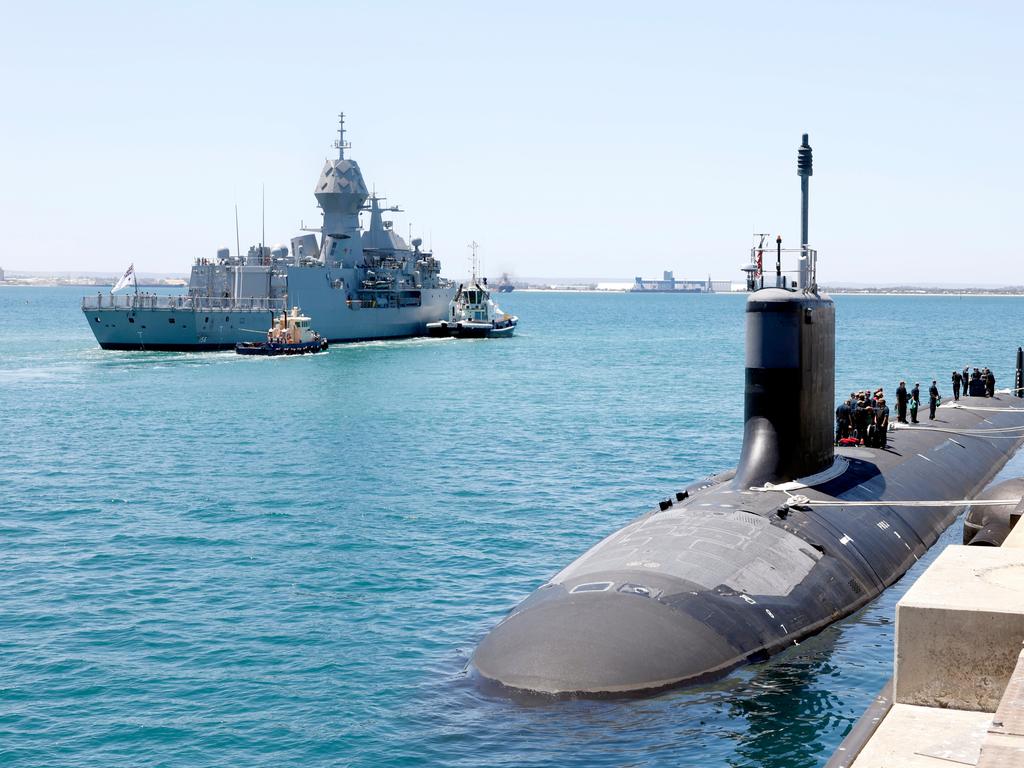China warns AUKUS has made Australia a target for the People’s Liberation Army
Chinese experts warn Australia has ‘officially put itself on Beijing’s defence radar’ with its massive defence acquisition.

Chinese experts have warned that Australia has put itself on the People Liberation Army’s “defence radar” as Beijing accused Canberra of stoking an “arms race” with its $368bn plan to build nuclear powered submarines with the United States and United Kingdom.
China’s Foreign Ministry said the AUKUS partnership was “typical Cold War mentality” that would stoke “an arms race” and undermine the international non-proliferation system, in Beijing’s first official comments after the mammoth defence acquisition was announced.
“Peace-loving countries have expressed serious concern and firm opposition to the damage to regional peace and stability,” Chinese Foreign Ministry spokesman Wang Wenbin said on Tuesday evening.
The Chinese government official said Australia, the US and the UK had gone “further and further down the wrong and dangerous road for their own geopolitical self-interest”.
Mr Wang also accused Canberra, Washington and London of engaging in “deception” to “coerce” the International Atomic Energy Agency to allow the deal, and signalled Beijing would continue its already 18-month long campaign to block the transfer of nuclear submarine technology.
Chinese government-linked academics and military officials said Australia’s mammoth defence acquisition was putting the country on the “frontline” of America and China’s strategic competition, which they said would worsen Canberra’s already strained relationship with its biggest trading partner.

Chen Hong, president of the Chinese Association of Australian Studies and director of the Australian Studies Centre at East China Normal University, said the AUKUS arrangement was a “time bomb”.
“Continuing promoting the alliance means that Australia will officially put itself on Beijing’s defence radar,” Professor Chen told China’s nationalistic tabloid the Global Times.
Chinese military expert Song Zhongping told the party-state masthead that Australia had become a “de facto offshoot of the US nuclear submarine fleet”, which elevated risks for Australian forces.
Taiwan welcomed the submarine deal, which senior members of President Tsai Ing-wen’s ruling Democratic Progressive Party said would help redress the “military imbalance” across the Taiwan Strait.
“The Ministry of Foreign Affairs is happy to see and welcomes the continued advancement of the AUKUS partnership,” a spokesman for Taiwan’s government said in a statement.
“As an important member of the Indo-Pacific region, Taiwan is located at the hub of the first island chain and at the forefront of the fight against authoritarian expansion.
“Taiwan will continue to co-operate with like-minded countries inside and outside the region, and strive to maintain the rules-based international order and safeguard regional peace, stability and prosperity.”
The Kuomintang (KMT), Taiwan’s main opposition party, also welcomed the submarine acquisition.
“We would like to see a stronger Western alliance in terms of military capability and technology,” said the KMT’s top international adviser Alexander Huang.
However, Professor Huang cautioned that the submarines, while helpful in the medium term, would not be in operation for more than 10 years.
“The changing dynamic that we are concerned about today is more near term,” he told The Australian.
Zhou Bo, a retired Senior Colonel of the People’s Liberation Army, said that eight nuclear powered submarines would complicate Beijing’s military planning.
“It will certainly make decision making in Beijing more complicated. But I would say China is strong enough or confident enough not to take these as game changers,” he told The Australian.
Mr Zhou, a senior fellow of the Centre for International Security and Strategy at Tsinghua University, said the submarine project would put Canberra in a “very difficult situation” as China and America’s strategic competition increases.
“I think the Australian government will find itself more and more sandwiched in the future,” he said.
The ambitious project to acquire world-leading nuclear submarine capability is a key plank in the response by America and its allies to the massive build-up of the capabilities of China’s People’s Liberation Army over the past decade. Beijing last week further ramped up military spending by more than 7 per cent to more than $330bn.
China’s diplomatic support of Russia’s invasion of Ukraine and heightened military activity around Taiwan has raised concerns about its intentions towards the island, which the Communist Party considers a rogue province.
There was no change to China’s Taiwan policy announced during the National People’s Congress, the country’s most important annual political meeting, which finished on Monday.
Mr Zhou, the retired PLA Senior Colonel, said there was a widespread misconception about Beijing’s intentions towards the self-governed island.
“First of all, China has never announced a timetable for reunification with Taiwan,” he said.
“Second, it is in our own best interest to have peaceful reunification with Taiwan, because what is the use of a Taiwan that is totally shattered?”
But he warned that the international community needed to beware of Beijing’s red lines. “Do not let mainland China believe that there is no more chance for peaceful reunification.”








To join the conversation, please log in. Don't have an account? Register
Join the conversation, you are commenting as Logout